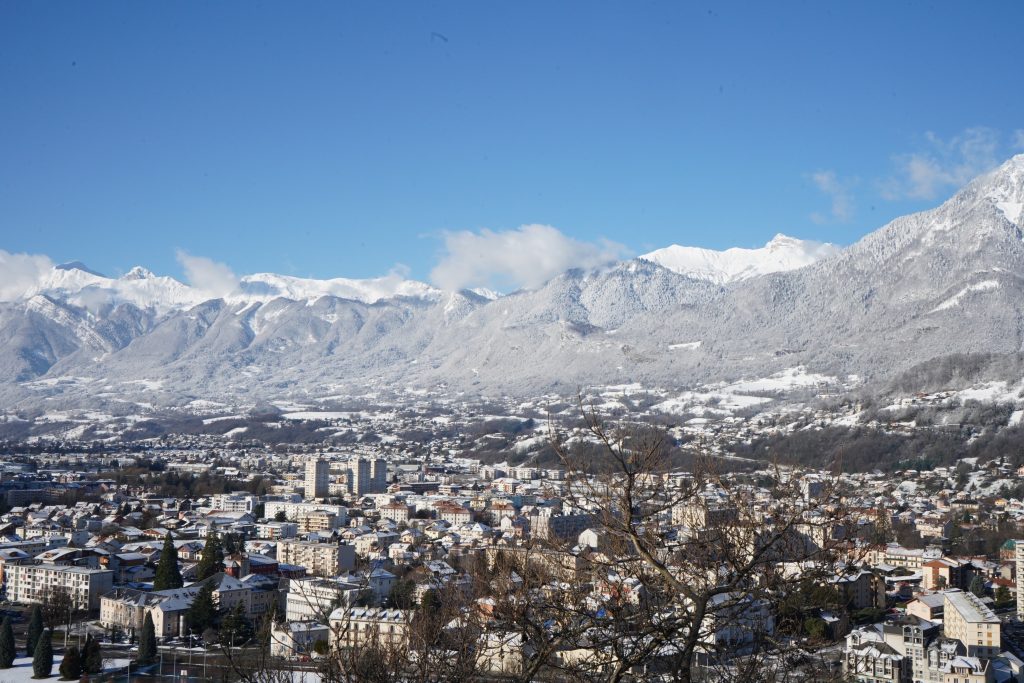Let’s meet SPARKLE’s cities: Albertville
The city aims to enhance its expertise in food systems and learn from partners’ experiences in the energy transition
Albertville, a small to medium-sized French city with around 20,000 inhabitants, is located in an Alpine area severely impacted by climate change. Despite its size, the city offers a full range of services comparable to a larger town, including a hospital, a TGV high-speed train station, access to the Alpine motorway network, local government representation, schools, and various sports and cultural centres.
We interview Sandrine Deternay from Albertville’s local council to learn more about the city’s journey towards sustainability.
How is Albertville working towards the green transition?
Both the city of Albertville and the wider region are committed to developing a Sustainable Energy and Climate Action Plan (SECAP) and achieving climate neutrality. Reducing energy consumption is a primary goal. This transition is supported by investments in local and renewable energy sources, including solar, hydroelectric, and hydrogen projects. Additionally, plans are underway to renovate all public schools to improve their energy efficiency. Albertville also approved a more ambitious plastic ban than the current national regulations.
In 2025, Albertville introduced an experimental “forest fund” to support investment in forest management and prevention measures against major natural disasters. To ensure the fund’s long-term viability as a revolving mechanism, the city is studying the valuation of ecosystem services provided by its forests, supported by an Interreg project and scientific partners.

What challenges is the city facing?
Albertville faces several problems in its efforts towards climate resilience and mitigation. Among them:
- Climate change impacts: reduced water access, rising temperatures negatively affecting the economy and agriculture, and more frequent or intense natural disasters.
- Food production limitations: insufficient organic and high-quality production, both at a national and local level. Moreover, organic production is facing lower consumer demand due to the high prices.
- Funding gaps: the transition requires significant investment, which exceeds currently available budgets. This means careful prioritisation is needed.
- Governance constraints: having to follow decisions made at regional or national levels limits local independence on certain issues.
- Public-private partnerships: although there’s interest from the private sector, local councils often lack experience in working with private investors to find alternative funding for projects.
- Citizen participation: despite having many active associations, the municipality has limited experience with structured ways of involving residents in decision-making.
- Balancing planning and action: finding the right balance between developing strategic plans like the SECAP and the council’s preference for taking immediate action.
- Data management and indicators: a need for better tools and methods to define useful indicators for tracking progress and managing the related data efficiently and effectively.
Albertville’s work within SPARKLE is particularly focused on the food systems pillar. How does the city tackle this complex area?
Supported by the inter-municipal organisation Arlysère, Albertville is actively engaged in a sustainable food plan known as the Projet Alimentaire Territorial (PAT). The PAT aims to connect producers with local consumers, including collective kitchens. The city’s central canteen prepares roughly 1,200 meals daily, serving schools, elderly residents, and several neighbouring municipalities. To encourage more resilient and high-quality local food production, the city has set up agreements with 15 local producers located within 20 km.
National regulations require municipal canteens to offer at least 50% of their products based on health and quality standards, with a minimum of 20% being certified organic. Despite this commitment, the local production struggles to meet the targets. The canteen processes food products internally, ensuring high-quality, healthy, and sustainable meals are provided. Staff have been trained to reduce waste and preserve nutrients. Additionally, food waste is collected by a local private company and converted into biogas. Arlysère provides residents and housing associations with composters, allowing them to process organic waste at home for gardening.
PAT aims to ensure everyone has access to healthy, high-quality food. Various associations help by offering free meals or running ‘solidarity grocery’ services for those in need. The shift towards sustainable food systems involves working together with all local food stakeholders, including supermarkets, town-centre shops, restaurants, and hotels.
Agriculture, including agritourism, plays a big part in the local economy. However, the sector faces several challenges: attracting younger generations, generating sufficient income, competition for land from housing and industry, and limited access to water.
A new school project aims to teach students about local nature and agriculture, using a special game designed to help them learn how to prevent food waste.
Why did you join SPARKLE? What are your expectations?
Albertville was invited by Energy Cities to join SPARKLE because of its expertise in sustainable food systems. The project is a chance to learn more and improve approaches for ensuring fair access to quality food, managing performance indicators, and utilising tools for land management and soil protection. Being involved will also help in evaluating the city’s action plan and forecasting budgets.
Furthermore, SPARKLE provides the opportunity to collaborate with specialists like the BETA Technological Center (UVic-UCC). Exchanging knowledge with international sustainability experts offers diverse perspectives and great learning opportunities. Moreover, Albertville looks forward to benefiting from the experiences of other EU cities in the energy transition field.
The Municipality wants to be a link between the SPARKLE project and the inter-municipal structure of Arlysère. Through this involvement, the city aims to encourage a broader shift in mindset towards sustainability locally.

